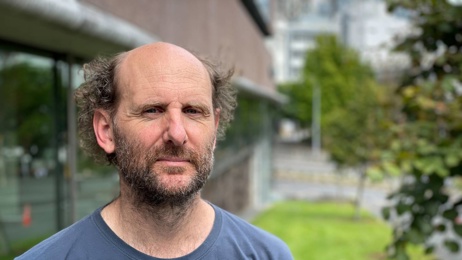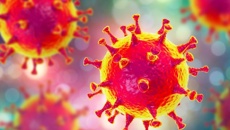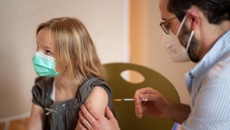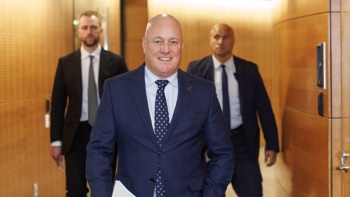COVID LATEST:
* Leading epidemiologist: How NZ can limit virus deaths in 2022
* NZ's booster shot rollout: All you need to know
* Omicron variant: South African Dr says 'unusual' symptoms did not make sense
* First country shuts doors to all foreign tourists over Omicron fears
* Omicron variant confirmed in Australia
Two cases of a new international Covid-19 variant were confirmed in Australia last night just days out from New Zealand entering its new traffic light pandemic response system.
Genomic testing confirmed two recent arrivals into Sydney were infected with the new Omicron strain.
The fully vaccinated travellers had arrived from southern Africa on Saturday and tested positive on arrival.
The two confirmed cases were among 14 people who had travelled on Qatar Airways QR908 from Doha. The remaining 12 passengers are undertaking 14 days of hotel quarantine.
The developments are likely to raise fears that the new mutation could soon arrive in New Zealand.
Prime Minister Jacinda Ardern said it was just too early to say whether Omicron was vaccine-resistant.
The World Health Organisation was undertaking research "very quickly" to find out how effective vaccines would be against this variant, whether it made people more or less sick and whether it was more infectious.
In a livestream posted to Facebook last night, she reassured followers that there were still a lot of safeguards in place because of the risk of variants. This included border controls, MIQ, testing people coming in at the border and carrying out whole genome sequencing to check which variant people had.
Countries where Omicron was mostly present had been classed as high-risk and the borders had been closed to them, Ardern said.
Only New Zealand citizens travelling from those countries can come in while more research is carried out and they get a better understanding of the impact of this new variant.
The Omicron variant comes as the Government here is racing to plug gaps in guidance about how the new traffic light system will work when it kicks in later this week following complaints by some local authority leaders that current advice was inadequate.
There is confusion about how things like swimming pools, camping grounds and Christmas parades will operate under the new regime.
Auckland has been locked down for more than 100 days. It will move to red, the most restrictive level, when the new Covid-19 Protection Framework starts at 11.59pm on Thursday.
Cabinet will meet today to decide which settings will be designated for other regions. The Prime Minister is expected to announce the decisions this afternoon.
Vaccine coverage, health system capacity, local Covid-19 transmission rates, and the strength of contact tracing and related services will determine traffic light settings.
Some regions with lower vaccination rates want the most restrictive settings for their areas to protect residents and prevent the virus' spread.
Epidemiologist Professor Michael Baker said today that news of a new Covid-19 variant, Omicron, was depressing.
"I know this is very depressing news for all of us - the fact this virus keeps evolving," he told TVNZ's Breakfast this morning.
The fact it was potentially very infectious was still being investigated. But he acknowledged the number of cases of the new variant already starting to pop up in countries overseas.
"It's obviously, as they say, fit enough to travel around the globe at the moment. But time will tell how well it performs.
"But at the moment, I think it's quite worrying that it's travelled so far."
Baker said more data was still needed about how this latest variant would act around the world.
It was still not known whether the Omicron variant would effectively be stronger than current vaccines being administered to the world's population.
"Really, the only way to stop these new variants emerging is to deliver vaccines to the whole planet - to everyone.
"That would really dampen down transmission."
Baker acknowledged news yesterday that the new variant had been detected in Australia.
New Zealand still had the chance to protect its borders and keep Omicron out.
"We can actually keep this variant out. It might affect how we loosen travel restrictions in the New Year - but it all depends on how serious this variant turns out to be."
Asked about today's expected announcement on the move into the traffic lights system, he said it would help give assurance to people who were vaccinated.
It would also give a nudge to those who are still hesitant about getting the jab.
Baker said last night that any regions that have established Covid-19 transmission should be placed in the red alert alongside Auckland.
While the South Island remains free of community cases, Baker believes no region should start in the green alert.
"Areas that are fully vaccinated and have no areas of ongoing transmission could start at the amber zone and everywhere else in the red zone if they have ongoing transmission or if their vaccination coverage is below 90 per cent.".
Baker said the new traffic light system may nudge the unvaccinated towards getting jabbed.
"It's reminding people that if you're in a society that means being indoors with other people, then you are going to have to be vaccinated in the future."
In Northland, Whangārei mayor Sheryl Mai and Kaipara mayor Dr Jason Smith expect the region to enter the traffic light system at red due to relatively low vaccination rates.
Mai said it was logistically too tricky now to arrange public events such as "Christmas parades and joyful things", which were unlikely to go ahead.
In Northland, 76 per cent of eligible people are fully vaccinated, and 85 per cent have received one dose. National rates are about 85 and 92 per cent respectively.
Draft guidance sent to local government leaders on Friday outlined multiple scenarios, including where vaccine passes will be needed.
But Mai said civil servants were still working on additional guidance for how local authorities would function under the new system.
"The feedback I'm getting is alert level 2 actually has fewer restrictions than the red traffic light category."
Smith said a red light setting would let vaccinated people leave the region to visit family, after being cut off from the rest of New Zealand since Auckland entered lockdown.
But there was confusion about rules for swimming pools, campsites, and parades.
And unvaccinated mayors or councillors around the country might be barred from attending meetings, Smith said, creating "challenges for democracy".
Thames-Coromandel mayor Sandra Goudie created controversy last month when she said publicly she would not get the Pfizer vaccine due to personal choice.
But it's unclear whether an unvaccinated mayor wanting to attend remotely could still chair a meeting if all other councillors convened in person.
Goudie declined to comment when contacted yesterday.
However, Thames-Coromandel councillor Gary Gotlieb said it would be cumbersome for an unvaxxed representative to chair a meeting remotely.
"It just is not practical if you've got the council meeting where everyone's there bar one or two."
Across the Bay of Plenty, 80 per cent of eligible people are fully vaccinated, and 89 partly vaccinated.
Western Bay of Plenty Mayor Garry Webber hoped his district entered the system in red, saying vaccination rates were too low.
"We should all be in red until we get the vaccination rates well above 90 per cent."
He said not everybody would agree with him, but a red light for the region would be better for local communities and for the country.
Regardless of how tight international and regional borders were, Delta still escaped Auckland's confines and threatened other regions, Webber said.
There were 144 new community cases reported yesterday and one death, with new infections in Northland, Auckland, Waikato, Bay of Plenty and Canterbury.
Webber said his district had some vulnerable communities with low vaccination rates.
"Iwi leaders are being quite vocal. Tūhoe nation are pretty much blocking off the whole area. They're savvy enough to know that bringing [Covid] into the community is the last thing they want."
Webber said he was sympathetic to affected business likely to lose revenue under a more restrictive system but support was available for struggling companies.
In the South Island, the Delta outbreak has infected very few people. In North Canterbury, Hurunui district mayor Marie Black hoped the region could start at the orange light.
"My understanding is, nobody will start in green anyway."
She said confusion persisted about the new system and more clarity was needed.
Take your Radio, Podcasts and Music with you









